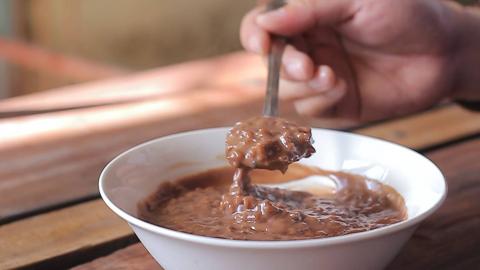Spooning and indulging in something chocolatey brown, sticky and sweet is really satisfying. Champorado is a staple Filipino comfort food best served hot!
Champorado is a rice porridge variation which uses unadulterated chocolate known as tableya. I like having champorado for breakfast, I grew up pairing it with buwad (dried fish) or buwad bolinao (anchovies). I know a lot of people like that odd sweet-salty combination teasing the taste buds but nevertheless palatable.
While the National Rice Awareness Month celebration was in full swing which took place in Valencia, Bukidnon last November 9, cacao champion Bernandino “Jun” Cagampang and family of JunLyn Farm in Canituan, Bukidnon was around to show support and showcased his tableya product and also his culinary prowess. He prepared a potful of champorado at the Rescuer's Stop by the Engallado's using his tableya which were processed from organically-grown cacao beans. His cacao beans plus organically-grown rice grains by the Engallado's would later result to a sumptuous bowl of the comfort food we have all grown to love. What makes his champorado extra special was the inclusion of an all-around traditional ingredient---coconut milk.
Creamy Champorado de Canituan
Ingredients:
6 to 8 cups water
1 cup uncooked glutinous rice
1 cup uncooked red rice (Engallado Red)
4 pieces of Tableya de Canituan
2 cups coconut milk
2 cups coco sugar
1 cup condensed milk
Procedure:
1. In a cooking pot, bring water to a boil.
2. Gradually add glutinous rice and red rice.
3. While waiting for the rice to be cooked and tender, dissolve the tableya using hot water in a separate bowl.
4. Add the dissolved tableya into the mix then stir occasionally to avoid scorching.
5. Add coconut milk and stir until the mixture thickens. Set the flame to medium low. Simmer for 10 minutes.
6. Add brown sugar and condensed milk to taste.
7. Transfer the champorado in individual serving bowls (makes 4-6 servings)
8. Serve, share and enjoy!

